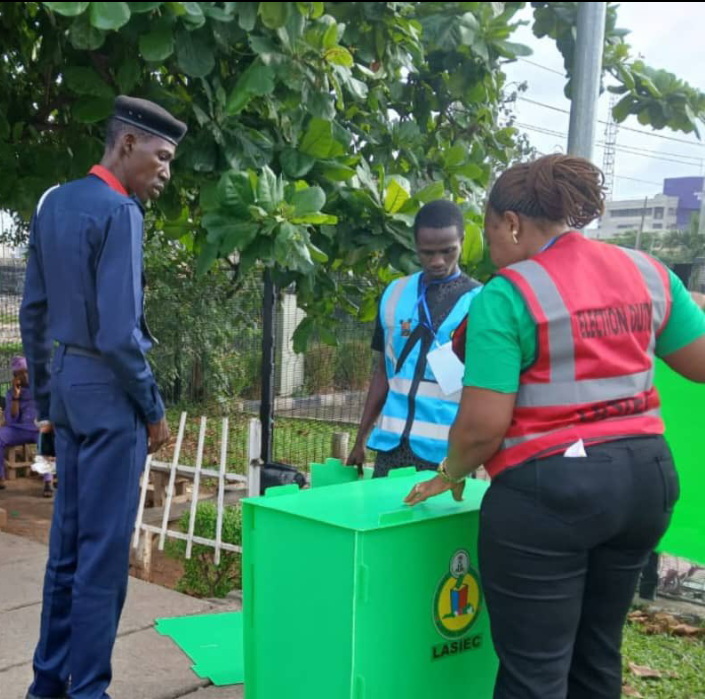
Tension in the Air as LASIEC Kicks Off Long-Awaited LGA Elections Across Lagos State

In what can only be described as a pivotal moment for grassroots democracy in Lagos State, the Lagos State Independent Electoral Commission (LASIEC) has officially commenced the long-anticipated Local Government Area (LGA) elections, sending waves of political tension and civic excitement through the state. From the early hours of today, LASIEC officials began arriving at designated polling units, signaling the start of a voting exercise that many believe will reshape the dynamics of local governance and determine the next crop of grassroots leaders in Nigeria’s commercial capital.
The atmosphere was charged as voters trooped out in several LGAs, hoping to cast their votes in an election many see as overdue. As early as 7:30 AM, LASIEC officials could be seen setting up polling stations, arranging sensitive materials under the watchful eyes of security operatives, and guiding voters through the electoral process. The early start, especially in areas such as Ikeja, Surulere, Eti-Osa, Mushin, and Agege, was welcomed by residents who had been monitoring developments since LASIEC’s announcement of the election timetable weeks ago.
The significance of this LGA election cannot be overstated. With many of the incumbent council chairmen and councilors completing their constitutionally mandated tenures, the election is viewed as a litmus test of not just the strength of political parties at the local level, but also the preparedness of LASIEC to conduct a credible, transparent, and violence-free election. Given the criticism the commission has faced in previous elections, this moment marks a fresh opportunity to rebuild public trust and reaffirm the credibility of the electoral process in Lagos State.
However, as with most elections in Nigeria, challenges have not been far behind. Reports trickling in from various polling units indicate pockets of late arrival of materials, missing voter registers, and complaints of low voter turnout in some areas. Some voters in Alimosho and Badagry expressed frustration over delays in accreditation, while others alleged partisanship by some election officials. Despite these hiccups, voting has continued relatively smoothly in several other locations, with party agents, observers, and community leaders monitoring the process closely.
Security has also been a key feature of the day, as armed police officers, members of the Nigeria Security and Civil Defence Corps (NSCDC), and other security agencies were deployed across polling units to maintain law and order. Their presence appeared to deter any attempts at violence or electoral malpractice in the early hours, with the hope that this trend continues throughout the exercise. Some voters admitted to feeling more confident with the visible security around polling stations, especially in hotspots previously known for electoral unrest.
Politically, this election has been billed as a contest of dominance, particularly between the ruling All Progressives Congress (APC) and a handful of opposition parties trying to break the ruling party’s stronghold at the grassroots level. Candidates have been campaigning feverishly over the past few weeks, promising development, security, infrastructure upgrades, and economic empowerment if elected. In many wards, the competition has been fierce, with party loyalists and community groups mobilizing in a last-minute effort to swing votes.
Observers from civil society groups such as YIAGA Africa and the Transition Monitoring Group (TMG) were also seen at some polling units, documenting proceedings, conducting voter education, and gathering reports of compliance or irregularities. Their presence has been regarded as crucial in lending transparency to the process and acting as a watchdog for both voters and officials.
While the turnout has varied from one locality to another, many stakeholders have expressed cautious optimism that the process will be largely peaceful and reflective of the will of the people. Youth groups and community development associations have taken to social media to encourage more citizens to come out and vote, emphasizing the power of local governments in directly impacting daily life — from waste management to road maintenance, primary education, and health services.
Meanwhile, the LASIEC Chairman, retired Justice Ayotunde Phillips, assured the public in a pre-election statement that all necessary measures had been taken to ensure a hitch-free process. She emphasized the commission’s commitment to neutrality and professionalism and urged Lagosians to take advantage of the opportunity to elect credible leaders into office. As the voting process continues and attention turns to vote counting and collation, all eyes are now on the commission to keep its word and deliver on its promise of transparency.
Social media platforms have been abuzz with live updates, photos from polling stations, and videos capturing both the orderly conduct in some areas and logistical lapses in others. Trending hashtags like #LagosLGAPolls, #LASIECelections, and #Grassroots2025 have dominated X (formerly Twitter) and Instagram as citizens, influencers, and political analysts track developments and share their opinions.
As at the time of filing this report, collation of results had not yet commenced, but voting was still ongoing in most wards, with officials assuring the public that no eligible voter would be disenfranchised as long as they were in line before the closing time. In the coming hours, the focus will shift to the collation centers, where results from the various wards will be tallied and announced.
This election is not just a formality; it is a crucial exercise in participatory governance and the foundation of the democratic process. For a city like Lagos, whose sheer size and complexity demand responsive and accountable local leadership, today’s polls represent a chance for citizens to chart a new course. Whether that chance is seized effectively by the people or squandered in apathy and irregularities remains to be seen.
Regardless of the final outcome, one thing is clear — Lagosians are watching. The voices of the electorate, especially at the grassroots level, are rising, and with the arrival of LASIEC officials and commencement of the voting process, a new chapter in Lagos local governance may just be unfolding.


